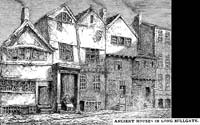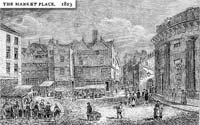
 Long Millgate, Manchester circa 1800 |
'THE PETERLOO MASSACRE'
Monday 16th August, 1819 St. Peter's Field, Manchester. An on-going project towards the 200th Anniversay in 2019 BEFORE ... ON THE DAY ... AFTERMATH |
 Market Place, Manchester in 1823 |
|
AFTER PETERLOO From: The Chronicle, 29th October, 1955 Following the massacre at Peterloo, or St. Peter's Square, Manchester, Oldham's reformers had rather a rough time and it was dangerous to be known as a reformer. Many publicans - and publicans were a privilegeged class - acted as spies and informers. This was repugnant to the reformers and they took steps to alter this state of things. Action was taken one Oldham Wakes. The Radicals erected tents and brewed their own beer. They held conversations as to what was, what ought to be, and what ought not to be, and what should be. They had a strict look-out to see that none were present except men known for their views on politics. In a very short time many publicans let it be known that the time was ripe for change. In spite of the publicans' change of heart many Radicals still met in private houses, principally on Sunday afternoons. A peck of ale would be brewed and the eatables would be muffins and toasted cheese. One of the favourite meeting places was at the home of Ben-at-Peacote's, near Sholver. At the meetings it was customary for someone who could read to read aloud Cobbett's "Twopenny Trash" as opponents described Cobbett's 'Political Register', Hetherington's 'The Poor Man's Guardian' and the 'Dispatch', in which the leader was sometimes written by William Johnson Fox, later to be M.P. for Oldham. All this caused a love of reading and the younger members of the families of the reformers took empty houses and old shops and bought timber with which to to make a few forms and desks. There were very few books available and these books and slates were brought from homes. A teacher would be chosen and the rest would pay him a few coppers for his trouble and with the scanty funds other books would be bought. Again the best day to meet was Sunday and the rooms began to be occupied on that day with the members buying newspapers and periodicals which were read and discussed. Different opinions were expressed and topics chosen for discussion. The Bible was read many times and the young men began to say that whatever man had written, man had a right to examine and contradict it if it were wrong.These men were deemed "infidels" although their opinions today would meet with approval by many highly-placed dignitaries in many churches. The early Sunday schools of the Christian churches were often used to teach reading and writing, and Mr. Hartley Bateson has described in detail that part of the history of the town's life. Similarly, the reformers had their own Sunday schools which instructed the young in reading and writing in addition to their own tnents of belief. The meeting places were generally known as Mutual Improvement Societies, although this title embraced societies of all kinds without reference to creed. The 'Labour Prophet' of the 1890s recalled the existence of Chartist Sunday Schools, particularly mentioning them at Ashton, Charlestown (a district of Ashton) and in Oldham, The Oldham branch would probably be in Grosvenor Street, on Boardman ground. Robert Owen, Richard Carlile and other leading men came to address the group. By the end of the eighteen-thirties the general name for this group was "Socialist." In 1839 this group started a co-operative society in Hopwood Street, close by their headquarters. Business increased and the society transferred to a larger shop ext door below the Grapes Hotel on Yorkshire Street, which failed because the shopman embezzled the capital. In a subsequent article I will deal with the activities of the co-operative ventrues. The Socialist group grew in numbers and they built their own premises, the Hall of Science in Horsedge Street, which later became the Temperance Hall and is now the store room of the Oldham Repertory club. The symbol of science which was given to Mr. Abraham Stott, was a carved statue of Sir Isaac Newton, and which was taken down within the last year or so and which was presented to the Libraries Committee. by Tom Webb, |
Monday 16th August, 1819 - The Peterloo Massacre in Manchester.